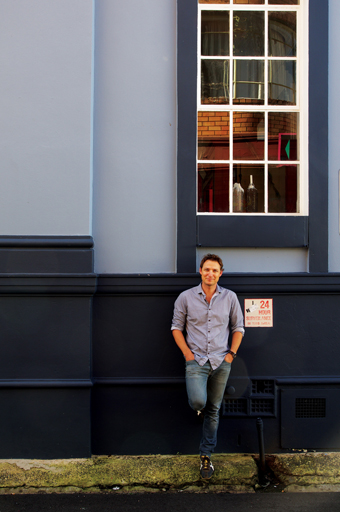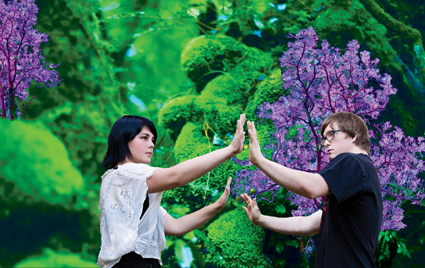Curating, caretaking & growing their own
Gail Priest: Julian Louis, NORPA

Julian Louis
photo Megan Louis
Julian Louis
Julian Louis recalls attending a lecture at NIDA delivered by Lyndon Terracini, founder of Northern Rivers Performing Arts (NORPA). “He was talking about creating theatre around the culture of place. I remember writing in my notebook, ‘I should call this guy for a job one day.’” Several years later Louis, by then a successful freelance theatre artist, was invited to apply not for just any job, but Terracini’s, taking over as NORPA’s artistic director in 2007.
Based in Lismore, NORPA has a three-fold role in the region. It presents an annual curated program of touring shows; creates its own work through the Generator program and is also the venue manager of Lismore City Hall. Previously NORPA was in charge of both the current venue, an old dance hall, and the Star Court Theatre, an old cinema, but under Louis’ reign the decision was made to concentrate on one space. In 2012 the owners of Lismore City Hall, the Lismore City Council, secured a $5m development grant from Regional Development Australia, enabling significant renovations to the city hall which re-opened as a shiny, new full equipped 496-seat theatre in 2013, just in time to celebrate NORPA’s 20th birthday.
Passing through
In terms of its curated program, NORPA tries to strike a balance between what’s described on their website as “risky productions” and “sure-fire entertainment.” Highlights from the 2014 program, just announced, include Lisa Wilson’s ambitious dance piece Lake (see RT111); Force Majeure/Belvoir’s production Food directed by Kate Champion and its writer Steve Rodgers (RT109) and Bell Shakespeare’s Henry 4 . For kids there’s Wulamanayumi and the Seven Pemanui by Blak Lines, directed by Eamon Flack—a Tiwi take on Snow White—and the season finishes off with a family favourite, Circus Oz.
Home grown
Through its Generator program NORPA aims to present one full production a year as part of its main season, with multiple projects at various stages of development bubbling away on the back burner. With the move to the new venue Louis says he felt the need to “amp up” new work creation to ensure balance: “there’s a demand and a real hunger for it.”
Louis steers the Generator program towards site-specificity and multidisciplinarity with projects that connect to the region through a combination of ideas and the people creating it. The program has completed four quite diverse works to date including a circus performance in a private home, Open House; a multimedia dance work, Beautiful Bones; and a community-based project with homeless people, culminating in an evening of installation and performance at the local soup kitchen in the Winsome Hotel. There’s also been the sell-out hit Railway Wonderland, directed by Louis, a site-specific performance on the disused railway station exploring stories of the town (see RT109, p29). Louis will continue to develop this work in 2014 with a view to touring.
Also in 2014 the second-stage development of a collaboration between Louis and the Animal Farm Collective (creators of Food Chain, see RT101) will take place. Cock Fight is a dance theatre work looking at male identity, aging and power play in an office environment. Commencing development in 2014 is Bundjalung Nghari: The Gathering, a collaboration between Louis and leading Indigenous artists, most of whom originally hail from the Northern Rivers: David Page, Frances Rings, Rhoda Roberts, Djon Mundine and Melissa Lucashenko. Louis says, “I’m interested in the multi-artform process so that we don’t end up having a dominant style in the work. There are so many stories [from the area] it’s overwhelming, [but] I think the right story will present itself.”

Phoebe Rose, Lydian Dunbar, My Radio Heart,
video still Sam James, photo Donatella Parisini
Phoebe Rose, Lydian Dunbar, My Radio Heart,
My Radio Heart
The major Generator presentation for 2014 is My Radio Heart, a collaboration with the local music group Tralala Blip which includes performers with and without disabilities. Louis approached Rosie Dennis to direct the show after seeing her large-scale community live art project Minto Live (2011, RT101) for Campbelltown Arts Centre. In My Radio Heart the audience will be immersed in the audiovisual world of the performers—a virtual reality game space in which the characters are on a quest to find something that’s missing—love, family, connection. The performance is driven by the band’s beautiful brand of sweet pop electronica.
Via email I asked Rosie Dennis about the process: “We’ve worked predominantly with local artists to realise a reasonably experimental work, in the sense that there is no real narrative, which leaves the ‘art’ open to interpretation. I started working on My Radio Heart when I was a freelance artist. Part-way through the development I was appointed Artistic Director of Urban Theatre Projects. While it hasn’t changed our creative process, it has meant that we’re able to do a season in Bankstown immediately following the Lismore premiere. I think this is a really interesting model, making/creating/devising work (whatever you want to call it) in the regions and then ‘exporting’ it to the city, or in our case Western Sydney. So often it’s the reverse, work made in our major capitals and toured to the regions.”
My Radio Heart, in both its development model, community engagement, and its performance style exemplifies Julian Louis’ mission for NORPA: to produce shows “that [are] about activating the whole space and putting people in close proximity to the story. I think that’s really the hallmark of the works that are most successful for us.”
NORPA & Urban Theatre Projects: My Radio Heart, directed by Rosie Dennis, featuring Tralala Blip, 27-29 March, Lismore City Hall; 9-12 April, Bankstown Arts Centre; www.norpa.org.au
RealTime issue #119 Feb-March 2014 pg. 34






